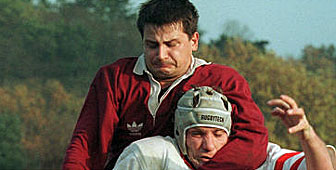Swiss rugby still looking for conversions

Despite the proximity of France and the large Anglophone expatriate community, rugby is still struggling to take root in Switzerland.
The national team has just completed the last of its qualifying matches for the 2003 World Cup in Australia, and, not surprisingly, the Swiss succumbed 30-11 to the relative might of Ukraine.
It was a similar story to other games this season: “We played well in the first half, but they were more aggressive than us, and scored two good breakaway tries in the second half,” says John Etheridge, who coaches the Swiss forwards.
Rugby has come a long way in Switzerland since the national federation was established in 1972. But the same is true of most countries. Switzerland is just one of a number of countries that have been smitten by the skill, excitement and beautiful brutality of the sport.
Having been “promoted” to Europe’s Pool B in the summer, Switzerland has lost to the Czech Republic and Croatia, but beaten Belgium. Now, second from bottom of their group, they must wait a fortnight to see if the international rugby authorities decide they should be relegated back to Pool C.
Small pool of players
The main factor holding back the development of the Swiss national side is the relatively small pool of players from which to select. There are fewer than 2,000 registered players in Switzerland.
“I think we’re in our rightful place in Pool B, as long as we have everyone fit. If we can have our best 20 or so players available, we can hold our own,” Etheridge, who played representative rugby for England and Ireland, told swissinfo. In the defeats against Ukraine and Croatia, the Swiss had nine players missing through injury.
Around 60 per cent of the squad hold Swiss passports. The remainder are foreigners who have fulfilled the criterion of having played for a Swiss club for at least three years. French, British and South Africans are among those proud to don the red and white of Switzerland.
While Etheridge, a former lock-forward, takes charge of the pack, a Frenchman, Régis Tabarini, coaches the backs. The result is a marriage of contrasting styles – disciplined Anglo-Saxon forward play combined with Gallic flair behind the scrum. At least, that is the theory.
“The main difficulty is getting everyone together for training. But team spirit is good,” Etheridge says.
More competitive
There are 24 clubs in Switzerland, and in an attempt to produce more competitive rugby on a more regular basis, the game was restructured at the end of last season. Now there are four divisions of six clubs.
“If you have 12 or 18 clubs in the top division, there would be teams getting a hiding every weekend,” Etheridge says. “It would be difficult then, to give players the motivation to turn up for training.”
“With six clubs of a similar standard, it’s a much tighter competition. Every game matters. One defeat could cost you the championship,” he explains.
Early signs are encouraging, but still problems remain. Three of the top flight teams – Geneva, Hermance and Zurich – are much stronger than the other three and, along with the handful of players based in France or Britain, provide the bulk of the national squad.
“Unfortunately, there’s no money in Swiss rugby,” Etheridge says, pointing out that it relies on the generosity of those who love the game. It’s a far cry from the slickly commercialised operation rugby has become, and more in keeping with the sport’s amateur traditions.
But another, more fundamental obstacle is standing in the way of Swiss rugby progress: “If I’m totally honest, the Swiss are too nice,” Etheridge says.
“You can change that mentality with time and with training. But we simply don’t have enough time together,” he adds.
by Roy Probert

In compliance with the JTI standards
More: SWI swissinfo.ch certified by the Journalism Trust Initiative








You can find an overview of ongoing debates with our journalists here . Please join us!
If you want to start a conversation about a topic raised in this article or want to report factual errors, email us at english@swissinfo.ch.